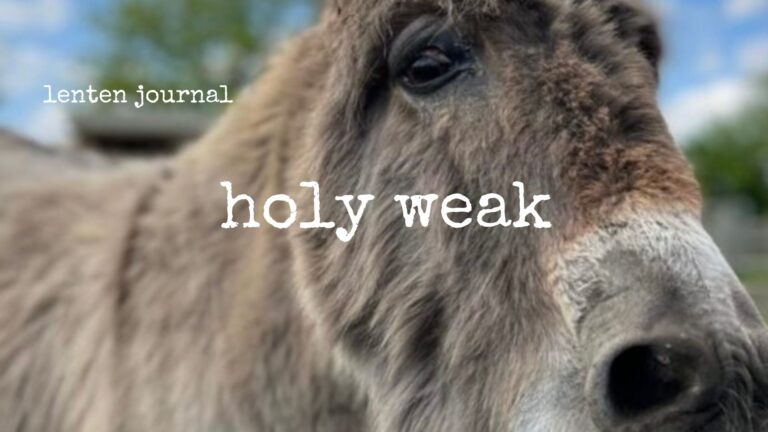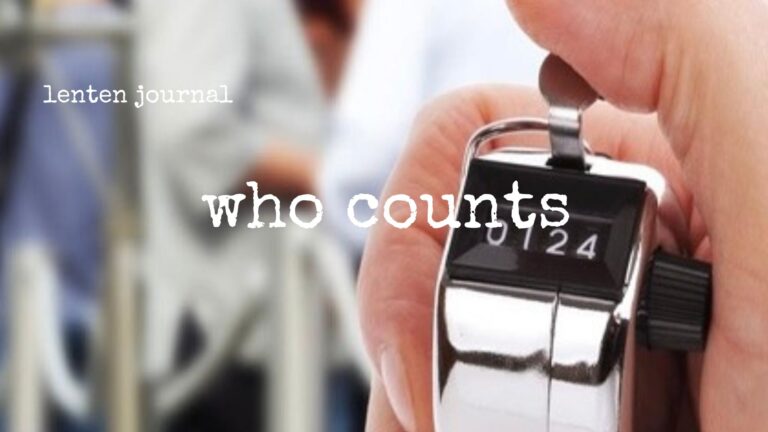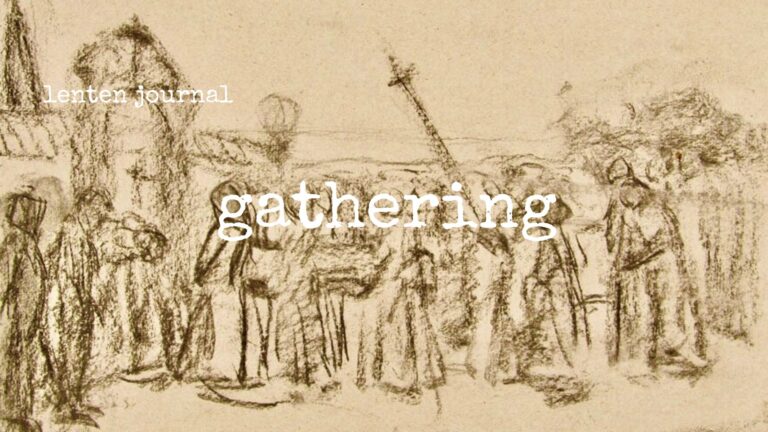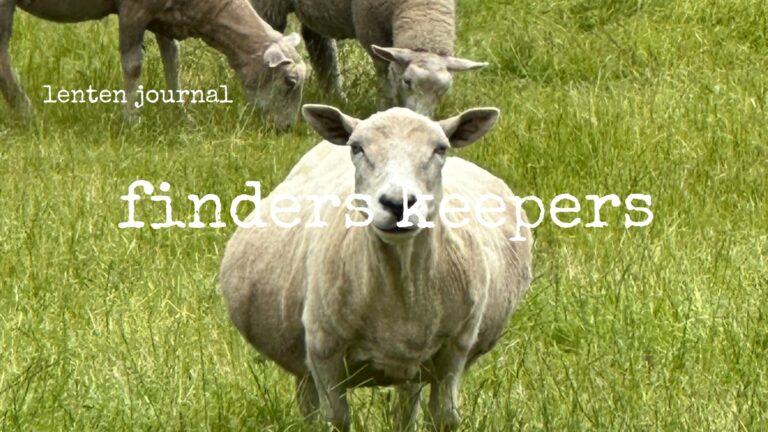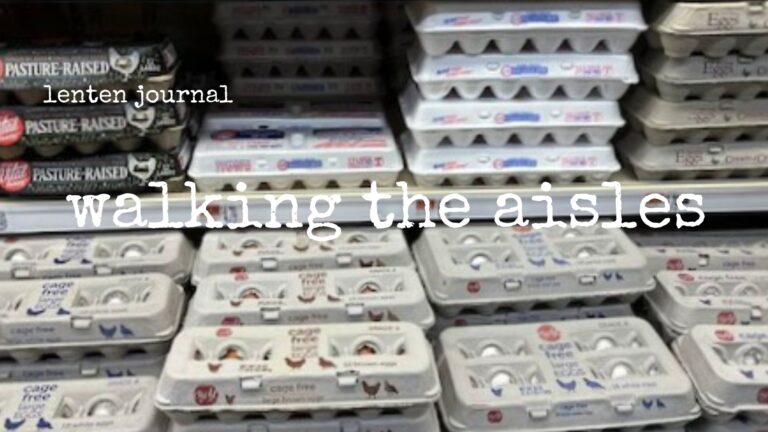I preached about the prodigal son—well, mostly the older brother—today, a week late by the Lectionary Clock, but it felt like the right time to me.
_________________________
Though we didn’t go back and read the verses that begin Luke 15 when Bev read our scripture, I want to do that now to remind us of the context for Jesus telling the three parables about being lost and found:
Now the tax collectors and other wrongdoers came near to listen to him. And the Pharisees and the scholars were griping loudly, saying, “He welcomes wrongdoers and eats with them.”
Their comment was what precipitated Jesus’ parables.
As we looked at the first two—about the lost sheep and the lost coin—last week, I asked you to put yourself in the place of the finders—the shepherd and the woman—and think about who needed you to find them.
I kept thinking about them this week, even as I was working on what to say about the father and sons, and it struck me that what both the shepherd and the woman went through was not a one-time thing. The shepherd had to count his sheep every night to make sure they were all there. And, if the woman was anything like me, she probably left change in forgotten pockets on a regular basis. She had to count her change consistently as well in order to keep up with it.
But that is what they did. They kept counting and looking and finding because what mattered was to make things whole. They found joy—joy worthy of a party—in that sense of wholeness.
Theologian Amy-Jill Levine, who teaches here in Connecticut at the Hartford International University for Religion and Peace, is the one who set me thinking about all that. She writes,
“If the lost sheep and the lost coin are about the coming together of a group that had been separated and is now whole, perhaps that should be the model in which we understand (the parable of) the prodigal son.”
Once again, I am going to ask that we not move to quickly to assign roles to where we or God fit in this story—and by that I mean, let’s think beyond God being the waiting father and our being the petulant younger son. We all may have other roles to play.
It is not by accident that Jesus started a number of his parables by saying, “A certain man had two sons . . .” because it was a familiar way for Jewish people to think about stories of faith. Hebrew scripture has several of them: Cain and Abel, Ishmael and Isaac, Esau and Jacob, Aaron and Moses. If we were to break down that list a bit we would realize that the biblical lesson appears to be, “It’s better to be the younger son.”
Well, Abel might beg to differ, but the pattern is there.
But the younger son in this parable is not particularly sympathetic. (And I’m not saying that because I’m an older brother.) I mean, look at him. He was rude to his dad in asking for his inheritance early, then he wasted it all without much thought and with a great deal of recklessness, and then he was kind of sketchy in the way he comes back after he had exhausted all his options, rather deviously strategizing about how to he can wiggle his way back into the house. He was not repentant any more than he thought he had to be.
And his dad didn’t care. He welcomed him home with the same joy the shepherd and the woman showed, throwing a big party because things were whole once more.
But there is one big difference between the father and the other two finders: the dad didn’t count. The shepherd knew he had a hundred sheep, and he counted every night to make sure they were all together. The woman counted her coins to keep up with her money because she was on a tight budget.
The father stood gazing down the road because he knew he had lost one son who had wandered away, but he didn’t count the one who stayed. Based on the way the eldest son reacted, we get the sense that his resentment at feeling uncounted ran far deeper than the situation than the afternoon of his brother’s return.
When the father went to ask why he wasn’t at the party, the eldest son exploded in rage and resentment. “This son of yours,” he said describing his brother, “did nothing but take advantage of you and you are throwing a party.” The son couldn’t see beyond himself and the anger he had allowed to fester because he felt uncounted—he couldn’t even say he had a brother. He was secure and had all he needed, yet he wasn’t satisfied or able to be joyful.
The father answered, “You live here and own everything. Come be joyful because ‘this brother of yours’ was lost and is found,” reminding his first born that he was not the only born.
Like the other two parables, the last word in the story is the invitation to “come share my joy.”
Except in this case, it isn’t really an ending, or even a resolution. When we try to use our sacred imagination to look beyond the last words, we can’t tell whether the family was ever made whole again; it depended on what the father and the oldest son did next. The father needed to learn to count—to remember even the ones that stay at home need to be found as well as fed.
The older brother had to decide if he was willing to make things whole again, which makes me think he’s really the one the story is about—or at least he’s the one on whom the heart of the story swings, because he was lost in plain sight and he was also the one who had to learn to be a finder if he, himself, was going to be found.
As are we, regardless of birth order. Levine says it this way:
“I am the older son. I don’t know what he will do. I don’t know what I will do. But the parable tells me what I should do because unless I make that move of reconciliation, there will be no wholeness, and if there’s no wholeness, there’s not peace.”
I would add to her words, if there’s no peace, there’s no joy to share.
The party is happening. The unflinching love and grace of God has invited everyone and is letting them all in as if they belong because they all do. That sounds like such good news until we think about what is required of us for everyone to belong. Even those people who don’t think everyone belongs are worth finding and bringing home. That’s a hard truth for me. I have to work hard to imagine that those who don’t think everyone is welcome are also welcome at the party.
We can’t say to God, “You need to do something about ‘that child of yours,’” before we will come to the party without expecting God to say, “You mean ‘that sibling of yours’?”
We are all wonderfully and uniquely created in the image of God and worthy to be loved. Every last one of us.
I’m not saying we just gloss over things. The oldest son reminds us what happens when we stuff away our feelings. There are plenty of hard conversations that need to be had. The family in the story would have all benefited from clear and current communication, from speaking the truth in love. They were fractured by years of things that had not been said or acted upon. That’s the point the father was making when he challenged his eldest about “that brother of yours.” He would not let his son act as though the other was not family.
Wholeness is hard work.
Still, the story ends in a bit of a mess as Jesus moved on to telling other parables about how we value one another, leaving things quite unresolved, much like many relationships in our lives, leaving us with this question:
What will we do to make things whole?
Regardless of who we are in the story, that is the question. The calling. Whether we feel like sheep or shepherds, losers or finders, desperate or content, fearful or hopeful, we are not alone, which is both a comfort and a challenge in this fractured and broken world we live in.
What will we do to make things whole? Amen.
Peace,
Milton
